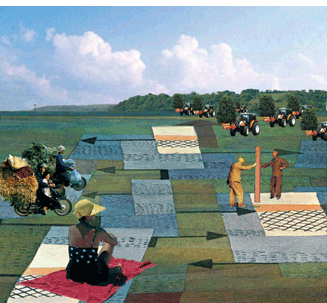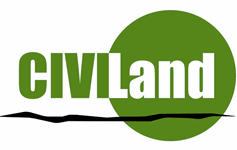Evaluation
Dr. Rupert Graf Strachwitz, Director of the Maecenata Institute for Philanthropy and Civil Society at Humboldt University, Berlin
The Cardiff conference was a good example of a lesson frequently to be learnt. Comparing notes internationally at an early stage makes everybody see his/her own issues more succinctly. From a German viewpoint, the continuity of government support for, and indeed insistence on a vibrant civil society is particularly interesting. For all its shortcomings that were presented and discussed, the big society programme is certainly preferable to the German top down, the-state-takes-all attitude. It is to be hoped that the Civiland project will be able to draw on the conclusions reached in Cardiff!
Evaluation of the “visually stimulated deliberation workshop” by the facilitator, Kenneth Anders
We have long wondered how we should name our brainchild: the different accesses to the landscape should be described through concise imagery and linked with theories put forward by discussions. The eventually found title “visually stimulated deliberation workshop” did in any case effectively express this as an ambitious matter.
Cultural Studies is the mediation between different forms of knowledge. If landscape and regional development were to be a subject of civil commitment, such mediation would be urgently needed. Science can only offer one of many perspectives and forms of knowledge and conversation therefore are necessary. Validity and relevance can be redefined in dialogue with civil society.
The workshop with British and German partners showed us how big this challenge was and what could be gained from it when one is perceptive enough. On a successful note, participants reflected their practice based on their experience, and gained critical distance and hermeneutic access to other perspectives. Where this was less successful, there remains at least the insight into the gap between landscape evocativeness and the precise instruments of landscape-related research. This conversation should be continued if we wish to bridge this gap.
The symposium "TOWARDS 'THE BIG ENVIRONMENTAL SOCIETY'?" as an experiment: What can we learn from it? - A brief report on the evaluation by the CIVILand team
A trans-disciplinary symposium, where various representatives from civil society, government and business learn qua societal comparison - is that possible? The conference organized by CIVILand at Cardiff University was an experiment that was meant not only to inspire new ideas in the participants but also encourage reflection. The CIVILand working group wanted to draw conclusions that show whether social learning processes can be stimulated across society.
The basis for the evaluation was created through a group discussion in the CIVILand circle, in which individual impressions were systematically evaluated. Secondly, the standardized survey for the symposium participants provided another opportunity for self reflection at three different points in time - before the start of the discussions, at the end of the first and second day. The results of the two data sources converged and complemented each other. Reasons for conflicting assessments were not found.
The generally positive evaluation of the whole event demonstrated a thought-provoking and friendly atmosphere, in which participants entered with a strong desire to learn. In particular, members of the CIVILand working group gained knowledge from the multifaceted and open discussions. However, those with a specific interest in only one subject line might have been disturbed by this. Overall, it can be noted that participants had a strong desire for discussions and would have gladly had more of it particularly on the first day. On the one hand, the almost overabundant suggestions and contributions for discussion introduced acted as barriers: apart from the opinions of the panelists there were also two lectures and two result summaries. On the other hand, the pressure for German participants to express themselves in an unfamiliar language hampered their participation in the discussions.
23 questionnaires were evaluated by participants present on the first day of the symposium. Of these, 13 were filled by men and 10 by women. With regard to the nationality, the questionnaires were answered by 14 German participants, 4 British and 5 interested citizens of other countries. The age structure of the group showed three approximately equal age groups of below 40, between 40 and 50 and over 50. On that day those working in science were about as equally represented as those employed in nature and environmental protection practice.
There unfortunately were only 10 questionnaire responses for the evaluation of the second day. This, as the CIVILand working group recalled, did not correlate with the participant numbers but reflected rather participants’ gradual dispersion into the weekend at the end of the symposium. The "visually stimulated workshop deliberation" could not stop this from happening. And since the suggestions for discussion here mainly reflected the conditions of a region in Germany, a stimulating but chiefly British discussion on the comparability and non-comparability of British conditions was therefore initiated. This however did not diminish the friendly and reflection stimulating atmosphere.
In summarizing, trans-disciplinary meetings which bilaterally consider various social relations will remain a challenge. More courage to take part in an open discussion can only emerge if the pressure of having to speak in a foreign language does not exist. Anyone who voluntarily enters such an experiment is usually interested to exchange ideas and ready to expand his/her horizons. And to offer such an occasion for the British-German relations was after all the declared goal of the symposium.

© 2025 Leibniz-Zentrum für Agrarlandschaftsforschung (ZALF) e.V.
Online: http://pes-conference.civiland-zalf.org/evaluation/index.php
Datum: 05.07.2025
